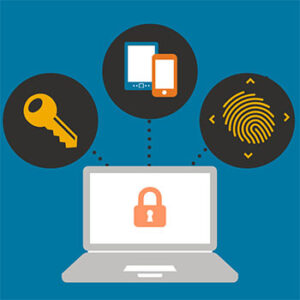Cybersecurity
Just the term “Cybersecurity” brings up a lot of thoughts and emotions. Mainly, fear – am I protected, could I be hacked and what will happen to me or my business if I am?
We won’t sugarcoat this. There are a lot of bad actors out there, and they can and do target small businesses like yours too. One of our jobs as your IT company is to try and protect you from all of this. However, any IT company that guarantees 100% safety from hackers is lying. When places like the Department of Defense get hacked, you get an idea of what you are potentially up against.
That said, what you need to do is make it a lot harder for them. Think about seatbelts. If you wear a seatbelt, does that 100% guarantee you’ll escape serious injury from a horrific car crash? No, it doesn’t, but it makes your chances a LOT better. We all wear our seatbelts for that reason. If we all wear our “cybersecurity seatbelts”, we make ourselves safer.
We currently have 9 security measures we want to discuss with you. All of them are affordable and all will help you secure your computers, networks, and data.
Here are a few of them:

Anti-Virus Software
We are a reseller of Trend Micro anti-virus software. If you purchase Trend anti-virus through us there are several benefits.
- The program has a small footprint, meaning the program itself doesn’t slow the computer down like many other antivirus programs do
- We set up all computers to run a full antivirus scan once a week
- We get weekly reports of any abnormal activity happening on your computers
- We get the emails when the licenses are due to be renewed and handle the entire renewal process.
- The weekly scans, reports, and annual licenses are all centrally managed by Murph Consulting. Absolutely nothing to do on your end here except pay for the annual licenses.

Password Managers
Long gone SHOULD be the days of having a password like “Password1” and/or using the same password for multiple websites, but many people still do it. We all have way more logins and passwords than we should be expected to remember, or that will fit on a post-it under your keyboard (yes, we know about that) and with a password manager we no longer need to. I personally have about 800 passwords saved in my vault, couldn’t tell you what any of those passwords are because they are intentionally complex and that is a VERY liberating feeling.

User Training
While putting as many levels of security in place as possible, without making your life technologically unbearable is super important, at the end of the day, it’s what our clients might click on that keeps us up at night. The more we can train our clients on what to look out for, the better position we’ll be in.
The service we recommend here will randomly send emails, once a month, to each employee that is a very real-looking fake email. Should the employee click on anything they shouldn’t, they are sent to a website that very respectfully explains what they clicked on and has them take a quick security test to better prepare them for the next fake email they will get.

Multi-factor authentication
While having complex passwords for all of your services is a good start, it isn’t enough. Multi-factor authentication (MFA) or 2-factor authentication, as the name implies, provides an extra layer of security to log in to an account. There are a few ways that works, but typically they will go through your phone in some fashion. The idea is you always have your phone on you, and the hacker doesn’t, even if they’ve just cracked your password.
Your email service of choice, your social media sites, and any reputable cloud-based services all use these multi-step authentication tools in order to verify your identity when you log into your account. Some people elect not to set up this authentication step because it can be a hassle- you have to enter a code from your phone in a short time period, but despite how many steps are involved, setting up MFA can be the difference between getting hacked and staying secure. Most of the major breaches you’ve heard about in the news involved MFA not being in place.
Think of it this way, the extra step you have to take to log in makes it MUCH harder for a hacker to log in to your accounts. It’s akin to leaving your front door unlocked and hoping nobody tries to open the door. If they DO try and find the door locked, they will probably go to the next house. Cybercriminals think in much the same way.
When To Call An IT Expert
If you are a small business owner, chances are you are wearing a lot of hats - account manager, sales manager, HR, accounting, and sometimes IT department, just to name a few. But sometimes, it makes sense to call in the experts. At Murph Consulting, we are the Help Desk with a Heart. That's because we are a small business as well. We feel your pain and want to help you get your systems up and running again with the least amount of aggravation possible.
Need IT Help?
Whether you're an existing client or need service for the first time, we remove the technology stress and headaches for you.

917-924-4084
support@murphconsulting.com
Brooklyn, NY
Help Desk with a Heart ®
Serving the needs of residential and business clients, Murph Consulting is a full-service IT consultancy with a small personal client approach. We specialize in on-site computer support, computer maintenance, new computer set-up, network consulting, and desktop support.